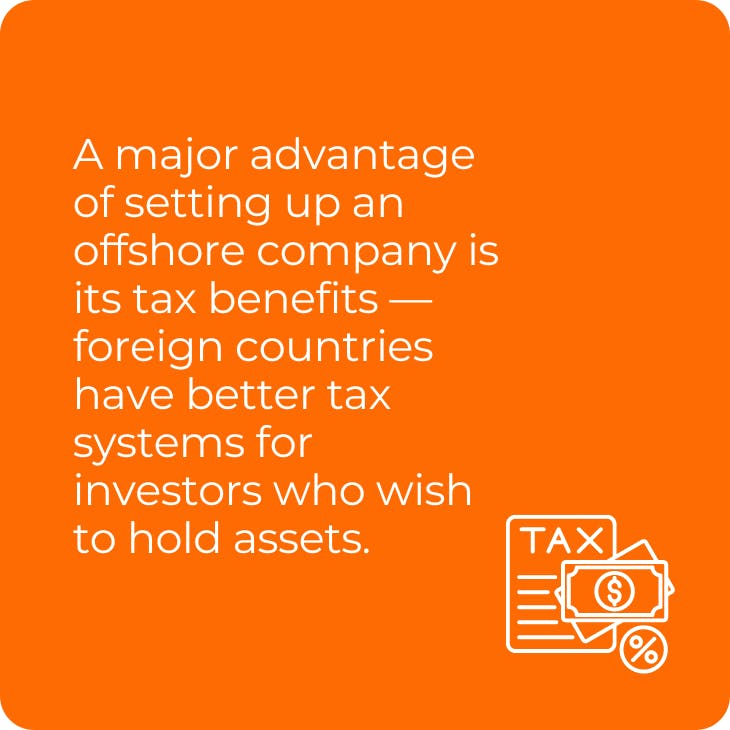An offshore company is a business registered and incorporated outside of the country where its owners or operators reside.
Offshore banking involves using the services of a bank located outside one's home country for legitimate financial activities.
Offshore companies can benefit from favorable tax systems, reducing corporate income tax liabilities on dividends, royalties, interests, and capital gains.
Setting up or relocating to an offshore company is legal. However, it becomes illegal when used for tax evasion or profiting from criminal activities.
Hong Kong is a popular jurisdiction for setting up offshore companies due to its favorable tax policies and business environment.
Have you ever considered offshore banking or wondered how you could legally lower your tax rate?
Did the Panama Papers leak make you question the legality of offshore companies?
Are you worried that you might be doing something illegal?
This article will debunk common misconceptions and answer all your questions regarding the legality of offshore company formation in Hong Kong.
Hong Kong offers the greatest incorporation benefits within the Asia Pacific region, as residency and high taxes are not a limitation.
As a result of benefits, including its strategic location and pro-business environment, Hong Kong has become an extremely popular country to set up an offshore company.
What Is An Offshore Company?
An offshore corporation is one that is set up to operate outside the jurisdiction and location of its operation and ultimate ownership.
Essentially, the company is registered in a different country from the country of residence of its stakeholders, whereas an onshore company is a domestic company that operates within the borders of the country of its incorporation.
Therefore, an offshore company allows you to hold assets in overseas countries, and such assets can range from real estate, financial investment, and company shares.
There are four different types of offshore companies:
- International Business Company
- Private Limited Company
- Limited Liability Company
- Global Business Company
Where individuals or corporations choose to set up an offshore company depends on the company's objectives, business goals, and size.
For example, larger and more varied companies may benefit from registering in Hong Kong or Singapore due to access to better business opportunities.
On the other hand, a smaller company or start-up may have different interests and may be more inclined to set up in a country with fewer accounting requirements and lower tax rates.
What Is Offshore Banking?
A common misconception is that all offshore bank accounts are associated with hiding or stashing money abroad.
However, there is nothing illegal about using the services of a bank outside your home country for legitimate reasons.
People also often assume that engaging in offshore banking is simply for the wealthy.
However, there are foreign banks that require as little as $300 to start an account.
An offshore bank is simply one that you have in a country you do not reside in.
They operate as any normal bank, allowing you to make and receive payments, set up current and savings accounts, and invest in different countries.
Some foreign banks are also limited to only doing business with particular foreign clients due to compliance requirements set out by organizations such as the Organisation for Economic Cooperation and Development and the World Trade Organisation.
However, how countries comply with these requirements is extremely relative, and some may even choose not to comply at all.
Why Do People Have Offshore Companies?
Many people and corporations choose to use offshore companies for various legitimate reasons such as benefiting from tax optimization, political and economic stability, more opportunities for international investment, greater privacy, and easy transfer of property ownership.
Tax optimization
A major advantage of setting up an offshore company is its tax benefits—foreign countries have better tax systems for investors who wish to hold assets.

In addition, if you hold an offshore company, you can reduce your corporate income tax liabilities by paying little to no tax on your earnings from dividends, royalties, interests, and capital gains.
Political and economic stability
Another major advantage of keeping money in foreign jurisdictions is that you can benefit from that nation's political and economic stability.
For example, if you live in a country in a state of civil war or a country facing a huge recession, incorporating your business overseas may be beneficial in terms of asset protection.
International investment and global trading
Holding an offshore company allows you to benefit from more international investment and global trading opportunities as you operate in a foreign country at a minimum cost.
Guaranteed privacy and confidentiality
If privacy and confidentiality are key to your business, setting up an offshore company is right for you.
Depending on your type of business, an offshore company allows you to benefit from further protection against company information leakages, as there are strict rules on guaranteed privacy of company ownership.
Easy transfer of property ownership
Many people opt for an offshore company due to its flexible nature.
Therefore, instead of transferring properties or other investments by a person, it is a much easier process through an offshore company.
Additionally, through an offshore company, you might not have to pay stamp duty or inheritance tax on such property transfers, enabling you to maximize your profits.
When does it become illegal?
It is important to note that setting up or relocating to have an offshore company is completely legal.
However, the façade of an offshore company can often be used for tax evasion and fraud.
Tax evasion
While tax avoidance is legal, tax evasion is not.
Tax avoidance is simply a legal way of taking advantage of existing loopholes in the system.
However, tax evasion includes hiding money and failing to report your earnings and the assets you hold to the shareholders of the company's resident country government.
Moreover, as offshore companies provide a certain degree of anonymity, people can often exploit this benefit and use it for money laundering and tax evasion.
Although setting up offshore companies is completely legal, they have cost governments a significant amount of money in terms of lost revenue due to tax evasion practices.
Profiting illegally
Hiding your ownership from law enforcement authorities, engaging in corrupt practices, profiting from criminal activity such as money laundering, fraud, and financing terrorist activity are all illegal uses of an offshore company.
How can I make sure everything is legal?
Bank consultation
Major banks, such as Barclays, have offshore departments that offer wealth management and corporate services to offshore entities.
Engaging with these banks will likely offer you legal protection should any taxman be curious about your operations abroad.
Legal consultation
Getting legal advice from an experienced lawyer in offshore corporate law and regulations is extremely beneficial.
Declaring offshore assets
Shareholders of an offshore company need to inform their home government about any offshore assets they own, as hiding their offshore business is potentially illegal.
Final words
Here is what you should keep in mind:
- An offshore company is one that is set up to operate outside the jurisdiction and location of its operation and ultimate ownership.
- There is a huge difference between tax evasion and tax avoidance
- Holding money in an offshore bank account is not illegal, and it is also not completely tax-free
- Shareholders of offshore companies should inform their government about any offshore assets they own, as hiding such assets can lead to criminal liability.
Looking to open an offshore company?
Hong Kong is one of the most popular offshore jurisdictions for opening a remote offshore business. Free taxes, baby!
Register with Air Corporate today and get approved in under 48 hours!






